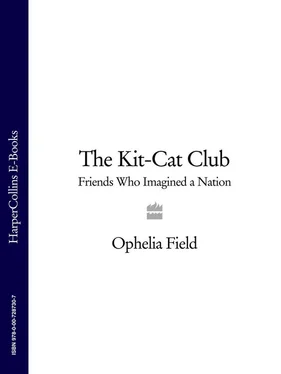It was too soon after the impeachment crisis for Halifax or Somers to be officially rehabilitated. Somers remained without official appointment, dividing his time between his townhouse in Leicester Square and his country retreat of Brookmans Manor, in Bell Bar, Hertfordshire. Halifax meanwhile remained Auditor of the Receipt, continuing to grant profitable administrative places to impecunious writers. One of these was a Kit-Cat named Arthur Maynwaring, who would become the Club's leading propagandist in the decade ahead. He had been a friend of Congreve's since Middle Temple days, at which time Maynwaring was just sloughing off his early Jacobite sympathies and converting—with all the fervency of a born-again believer—to post-Revolutionary Whiggism. He had been among Dryden's literary disciples at Will's Coffee House, then another of Lord Dorset's protégés, and now in 1701 he was passed along from Dorset to the care of Halifax's patronage, thereby gaining a place as a Commissioner in the Customs House.
Addison remained another of Halifax's charges. He was travelling north from Florence to Geneva at the end of 1701, just as Halifax and Somers were beginning to regain their influence, and as he crossed the Alps, ‘shivering among the Eternal snows’, Addison claimed he distracted himself from his vertigo by composing, upon horseback, a verse ‘Letter from Italy to Lord Halifax’. 2
Richard Steele, meanwhile, spent the summer of 1701 lodging in Wandsworth with a woman who tutored girls—an experience that may well have shaped his later views in favour of promoting female literacy. Steele was working hard on his first play, The Funeral , while spending his leisure time with Congreve, who was passing the summer just across the river in Chelsea. Tonson had already published Steele's first work, a didactic moral tract entitled The Christian Hero , suggesting that no overly hard feelings remained over the seduction of Tonson's niece. Given the impeachment proceedings that were commencing at the time, Steele had dedicated the tract not to any Junto lord, but to his army boss Lord Cutts. The primary aim of The Christian Hero was to make its author some quick cash, and indeed the book proved a bestseller in those Collierite times, running to twenty editions. Steele's literary friends, however, teased him as a hypocrite given his recent sexual indiscretions, including a dalliance with a woman called ‘Black Moll’ and a duel fought in Hyde Park against another Irish army officer, most likely over a woman. The wits ‘measured the least levity in his words and actions, with the character of a Christian Hero’. 3 Whether due to these friends' teasing or the reflective exercise of writing the book, Steele does appear to have reformed his sex life after 1701. His spending habits were less easily cured, however. In a letter to an army friend at this date, he confided that ‘nothing can really make my heart ache but a dun’. 4
Steele wrote The Funeral , like The Christian Hero , with an eye to commercial success, aiming to please censorious theatre audiences, but also to ‘to enliven his character’ in the eyes of his literary friends, 5 since, as he put it, ‘Nothing can make the Town so fond of a Man as a successful Play.’ 6 For good measure, the play's anti-French jokes capitalized on the town's rising mood of bellicose Protestant patriotism. Even in December 1701, however, when the play opened and went to the printers, Steele remained politically cautious: he dedicated it to the wife of William's Dutch favourite, Keppel, rather than to an Englishman of a particular party or faction. The Funeral was, as hoped, an instant hit, performed more than 170 times over the next five years. Steele's reputation as a popular (if not erudite) writer was made, as was his career in the rearming army: as reward for his literary success, he was given a commission as Captain in the new 34th Regiment of Foot.
Two days before Steele received his commission, on 8 March 1702, King William died following a fall from his horse, and his sister-in-law Anne assumed the throne. Intelligent and diligent, Anne could also be stubborn and oversensitive. Innately Tory, she believed it her royal duty to stand above party and resented any attempt by political factions to force her decisions, begging Lord Godolphin, whom she appointed as Lord Treasurer, to help her keep out ‘of the power of the Merciless men of both parties’. 7 Anne was, furthermore, devoutly religious, personally repelled by what she regarded as the gross immorality and open impiety of the Junto lords. The Tories played upon Anne's High Church prudishness, increasing their efforts to expose the Kit-Cat politicians' private sleaze, not only to shock Anne and the Collierites, but also to challenge the Whigs' claim to be ‘dispassionate’ men.
Anne held a grudge against Halifax, Wharton and Somers for their role in supporting her expulsion from William and Mary's Court back in the early 1690s. Several Kit-Cats complained in the House of Lords upon the publication of a history by one Dr Drake, who implied that the Junto had treated Anne disrespectfully and done everything it could to prevent her succession. Another Tory, Charles Davenant, wrote a pamphlet in which a Whig character confesses that preventing Anne's succession ‘was the Discourse of all our Clubs’. 8
The Junto Whigs' rising hopes and ambitions therefore collapsed upon Anne's accession. Somers, who even in his unemployment had maintained an advisory relationship with William, was now persona non grata at Anne's Court, not even permitted to continue as a magistrate in his native Worcestershire. Halifax and Wharton were immediately dismissed from the Privy Council. The man replacing Wharton as Comptroller of the Royal Household, the Tory Sir Edward Seymour, declared in the Commons what a pleasure it was ‘to have a Queen that was entirely English’. 9 Jack Smith, the leading Kit-Cat in the lower house, replied indignantly that ‘none but one whose heart was truly French would make a reflection on his late Majesty’. 10 Defence of King William's memory quickly became the new litmus test of Whig allegiance.
Vanbrugh foresaw the sudden demotion of his patron Carlisle, who handed the Treasury back to Godolphin after less than three months in the job. Vanbrugh therefore bought a new army commission to keep himself afloat were Castle Howard's construction put on hold. Carlisle had also organized for Vanbrugh to be appointed Comptroller of the Board of Works—a part-time job, paid accordingly, but with several houses attached, which Vanbrugh could rent out for profit. In this way, a state income relieved the Earl of the personal expense of paying Vanbrugh's salary as an architect. The appointment came through in May 1702, with Vanbrugh supplanting William Talman for a second time. In fact, the Earl continued to build Castle Howard with additional vigour after his dismissal, as if not to lose face. By the end of 1702, there was a roof on the east wing and work starting on the central block.
Manchester also lost his job as Secretary of State for the South following Anne's accession. Lingering in Geneva, Addison had hoped that, through the influence of Manchester or Halifax, he might be appointed as English representative to the army camp of Prince Eugene of Savoy, the Imperial Commander and Marlborough's most useful ally in the impending war. However, with news of William's death and of the demotion of so many Kit-Cat patrons, Addison's hopes were dashed.
The Kit-Cat Club would function as a centre of opposition to Anne's first, Tory-dominated administration. Anne's ministerial favourites—Godolphin, Marlborough, and later Harley—tried, futilely, to claim they stood aloof from party like the monarch herself, but, like Anne, all three leaned instinctively towards the Tories. Anne chose to retain just two non-Harleyite Whigs in her first ministry, one of whom was the Duke of Somerset—his reward for having stood by Anne and the Marlboroughs during their 1690s quarrels with William and Mary. Somerset, in turn, was able to retain and even promote his personal Kit-Cat clients. Most significantly, Harry Boyle, a cousin of Somerset's, remained Chancellor of the Exchequer. A fictionalized record of a Kit-Cat meeting in the weeks before King William's death had depicted the Club, like a mock-parliament, passing a motion that ‘Harry Boyle's head of hair be demolished and afterwards burned by the hand of the Common hangman’. Apparently, Boyle's wig had turned rancid with the pomatum (gum or grease) used to thicken it, and was offending their noses. Now that the political ground had shifted, leaving so few Kit-Cats in government, Boyle became a much more important figure, worthy of respect.
Читать дальше












